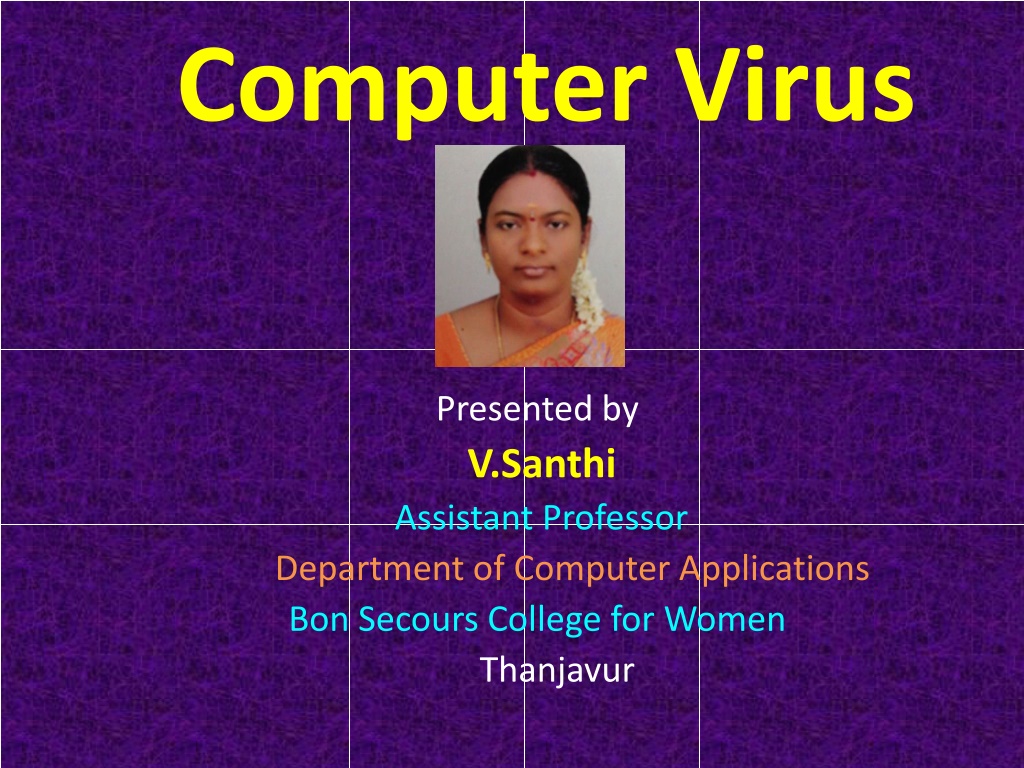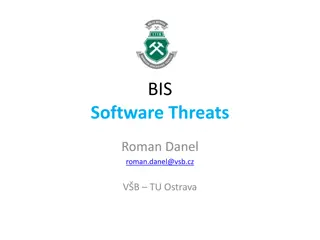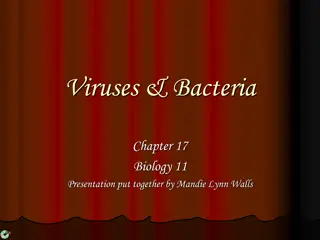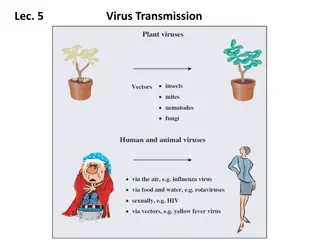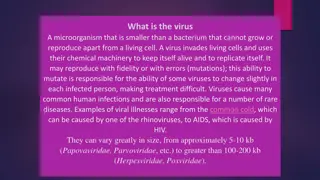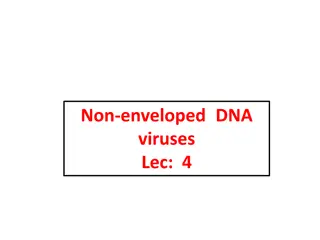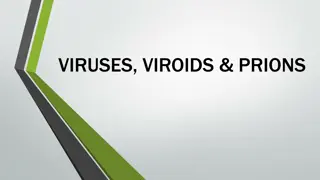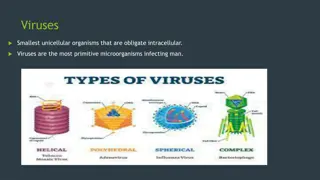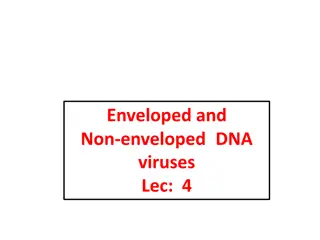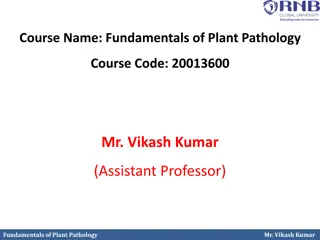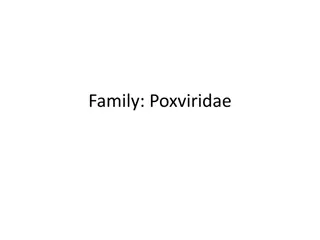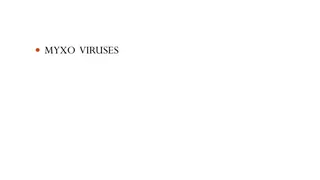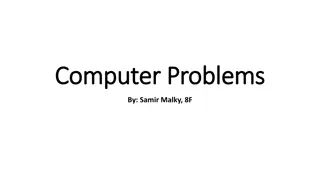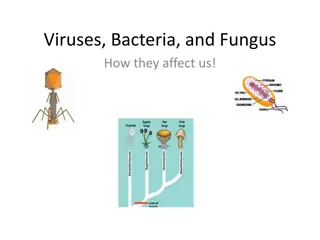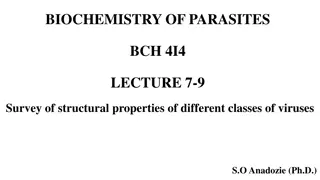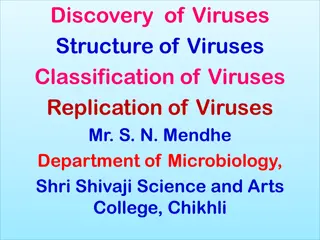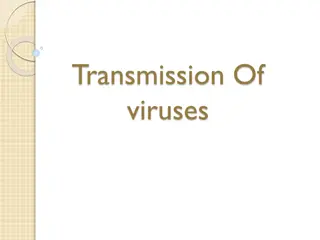Understanding Computer Viruses and Their Types
Computer viruses, created by malicious hackers, are programs that can replicate themselves and harm computer systems by damaging data files. They can cause various issues like slow response, crashes, and distorted graphics. Common virus types include time bombs, logical bombs, worms, and boot sector viruses. Recognizing symptoms and understanding these threats is crucial for computer security.
Download Presentation

Please find below an Image/Link to download the presentation.
The content on the website is provided AS IS for your information and personal use only. It may not be sold, licensed, or shared on other websites without obtaining consent from the author. Download presentation by click this link. If you encounter any issues during the download, it is possible that the publisher has removed the file from their server.
E N D
Presentation Transcript
Computer Virus Presented by V.Santhi Assistant Professor Department of Computer Applications Bon Secours College for Women Thanjavur
Virus A virus is a program designed by a computer programmer (malicious hacker) to do a certain unwanted function. Computer virus refers to a program which damages computer systems and/or destroys or erases data files
A Computer Virus is a program that can copy itself and infect a computer without the permission or knowledge of the user. A Computer Virus has 2 major characteristics: the ability to replicate itself, and the ability to attach itself to another computer file... Computer Viruses affect the computerin many ways. It can destroy data, files or programs and cause the system malfunction. The destructive effects of viruses are different according to their types.
Symptoms The following are a few Symptoms that your computer might have a virus: Slow response and slow program execution. Random hard drive crashes and restarts. Distorted graphics and text. Files that have mysteriously vanished. Extensive pop-up ads. Inability to open files with existing passwords.
Types of Computer Virus Time Bomb Logical Bomb Worm Boot Sector Virus Macros Virus Script Virus Trojan Horse
Time Bomb A time bomb is a virus program that performs an activity on a particular date
Logical Bomb A logical bomb is a destructive program that performs an activity when a certain action has occurred.
Worm Virus A worm is also a destructive program that fills a computer system with self-replicating information, clogging the system so that its operations are slowed down or stopped
Boot Sector Virus A boot sector virus infects boot sector of computers. During system boot, boot sector virus is loaded into main memory and destroys data stored in hard disk
Macro Virus A macro virus is associated with application software like word and excel. When opening the infected document, macro virus is loaded into main memory and destroys the data stored in hard disk
Script Virus Commonly found script viruses are written using the Visual Basic Scripting edition (VBS) and the JavaScript programming languages
Trojan Horse Trojan Horse is a destructive program. It usually pretends as computer games or application software. If executed, computer system will be damaged.
Trojan Horse Trojan Horse usually comes with monitoring tools and key loggers
WHAT A COMPUTER VIRUSDO? SLOW DOWN THE NETWORK HIJACK YOUR COMPUTER CORRUPT DATA STEAL DISABLE HARDWARE CONFIDENTIAL DATA DISPLAY MESSAGES DELETE DATA
Kespersky Antivirus Data fellows E-Plot Mcafee Antivirus Symantec Norton Antivirus Bit Defender 2010 Quick Heal Antivirus ESaSS ThunderBYTE
Actions to prevent virus infection Always update your anti-virus software at least weekly. Back up your important files and ensure that they can be restored. Change the computer's boot sequence to always start the PC from its hard drive
Actions to prevent virus infection Don't share Drive C: without a password and without read-only restrictions. Empty floppy drives of diskettes before turning on computers, especially laptops.
Actions to prevent virus infection Forget opening unexpected e-mail attachments, even if they're from friends Get trained on your computer's anti-virus software and use it. Have multiple backups of important files. This lowers the chance that all are infected.
Actions to prevent virus infection Install security updates for your operating system and programs as soon as possible. Jump at the chance to learn more about your computer. This will help you spot viruses.
